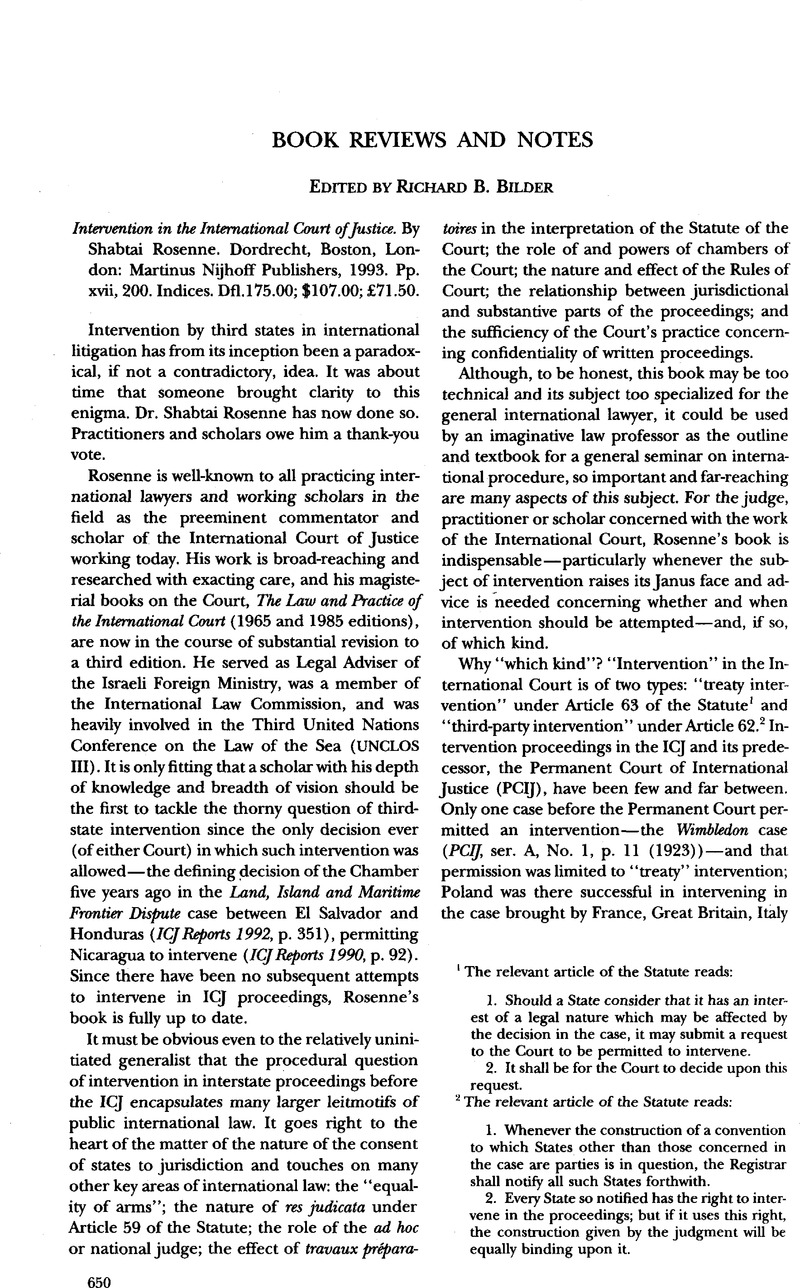No CrossRef data available.
Article contents
Intervention in the International Court of Justice. By Shabtai Rosenne. Dordrecht, Boston, London: Martinus Nijhoff Publishers, 1993. Pp. xvii, 200. Indices. Dfl. 175.00; $107.00; £71.50.
Published online by Cambridge University Press: 27 February 2017
Abstract

- Type
- Book Reviews and Notes
- Information
- Copyright
- Copyright © American Society of International Law 1995
References
1 The relevant article of the Statute reads:
-
1. Should a State consider that it has an interest of a legal nature which may be affected by the decision in the case, it may submit a request to the Court to be permitted to intervene.
-
2. It shall be for the Court to decide upon this request.
2 The relevant article of the Statute reads:
-
1. Whenever the construction of a convention to which States other than those concerned in the case are parties is in question, the Registrar shall notify all such States forthwith.
-
2. Every State so notified has the right to intervene in the proceedings; but if it uses this right, the construction given by the judgment will be equally binding upon it.
3 See Rules of Court, Art. 53(1):
The Court, or the President if the Court is not sitting, may at any time decide, after ascertaining the views of the parties, that copies of the pleadings and documents annexed shall be made available to a State entitled to appear before it which has asked to be furnished with such copies.
This is discretionary, and the discretion is usually exercised in favor of retaining confidentiality.
4 “[An application for permission to intervene] shall set out: (a) the interest of a legal nature which the State applying to intervene considers may be affected by the decision in that case ….”
5 The present reviewer served as Counsel and Advocate in the Malta Intervention case in 1981, as adviser in the Italian Intervention case in 1984, and as Counsel and Advocate in the Land, Island and Maritime Frontier case in 1990.
6 “The decision of the Court has no binding force except between the parties and in respect of that particular case.”
7 See Rules of Court, Art. 39 (2): “The notification [of the special agreement] shall also, in so far as this is not already apparent from the agreement, indicate the precise subject of the dispute and identify the parties to it.” The “precise subject of the dispute” is a long way from a precise statement of the claims of the parties to the dispute, and it would be only in considering the impact of those claims that “the interest of a legal nature which [it] considers may be affected by the decision in that case” could be properly indicated.
8 In cases brought by application under Article 38 of the Rules, of course, the claims of the applicant are set forth, and are therefore reproduced and circularized to all entided states by the Registrar—but that is not true of the claims or counterclaims of the respondent.
9 Article 47 reads:
The Court may at any time direct that the proceedings in two or more cases be joined. It may also direct that the written or oral proceedings, including the calling of witnesses, be in common; or the Court may, without effecting any formal joinder, direct common action in any of these respects.
10 See generally Keith Highet, The Peace Palace Heats Up: The World Court in Business Again?, 85 AJIL 646 (1991) (esp. at 649 n.41). For a little-noticed but extraordinary analysis of the institution of ad hoc chambers, see the lengthy and unusual dissenting opinion of Judge Shahabuddeen appended to the Court’s Order of February 28, 1990, in Land, Island and Maritime Frontier Dispute (1990 ICJ Rep. 3, 18–62). This deserves far greater attention from scholars and commentators than it has received, doubdess because of its being appended to an Order of the Court rather than to a Judgment. But see Elihu Lauterpacht, Aspects of the Administration of International Justice 90–98 (1991).


